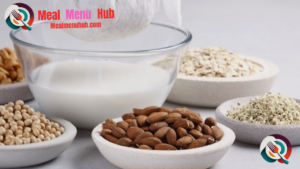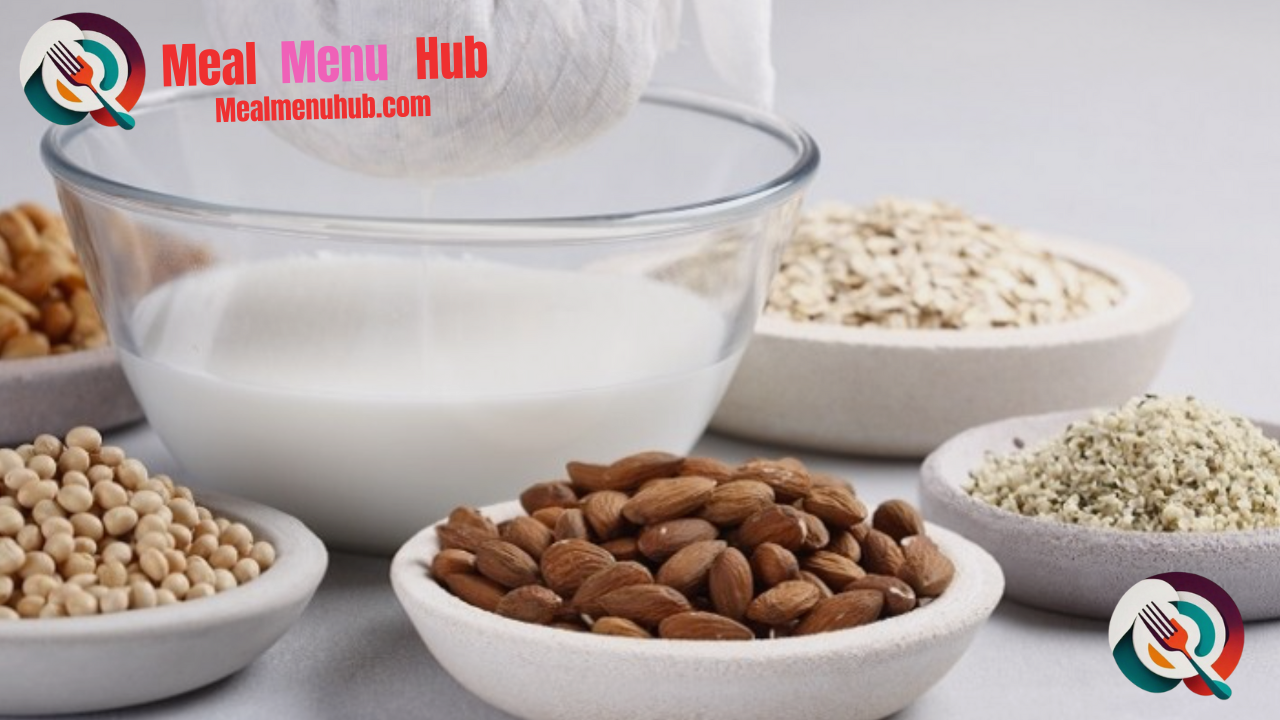Dairy-Free Alternatives
Dairy-Free Alternatives Choosing to go dairy-free can be a big shift in lifestyle, especially if you’re used to the familiar taste and texture of milk, cheese, and yogurt. But with the wide range of dairy-free alternatives available today, you can find options that suit your taste and dietary needs. Let’s dive into the benefits, options, and tips for choosing dairy-free products that make the transition easier and enjoyable.Dairy-Free Alternatives

Why Consider Dairy-Free Options?
Health Benefits
For many people, going dairy-free can relieve digestive discomfort, boost skin health, and even aid in weight management. If you’re lactose intolerant or allergic to dairy proteins, removing dairy from your diet can significantly improve your wellbeing.Dairy-Free Alternatives
Environmental Impact
The dairy industry has a significant environmental footprint, including greenhouse gas emissions and high water usage. Switching to plant-based options like almond or oat milk can reduce your environmental impact.Dairy-Free Alternatives
Dietary Restrictions and Allergies
Many people are allergic to dairy or struggle with lactose intolerance. For them, dairy-free alternatives offer the chance to enjoy creamy, delicious products without compromising their health.Dairy-Free Alternatives
Common Dairy Products and Their Alternatives
Milk
Instead of traditional cow’s milk, there are a variety of options, from almond to soy milk. Each comes with unique flavors and health benefits.Dairy-Free Alternatives
Cheese
Dairy-free cheeses made from cashews, almonds, or soy can be a tasty addition to sandwiches or pizza.Dairy-Free Alternatives
Yogurt
Coconut, soy, and almond-based yogurts offer creamy textures and probiotic benefits without dairy.Dairy-Free Alternatives
Butter
Substitutes like coconut oil or vegan margarine work great for spreading and cooking.Dairy-Free Alternatives
Popular Dairy-Free Milk Alternatives
Almond Milk
Almond milk is a popular choice for its nutty flavor and low calorie count. It’s great for cereal, smoothies, and coffee.Dairy-Free Alternatives
Soy Milk
Rich in protein, soy milk has a creamy consistency that works well in savory and sweet recipes.Dairy-Free Alternatives
Oat Milk
Oat milk has a mild taste and creamy texture, making it perfect for coffee and lattes. It’s also rich in fiber and other nutrients.
Coconut Milk
Coconut milk brings a subtle sweetness and works well in curries and desserts.
Rice Milk
Rice milk is the mildest in flavor, with a thin texture. It’s hypoallergenic, which is ideal for those with nut or soy allergies.
Choosing the Right Dairy-Free Milk for You
Each milk alternative has its own texture, taste, and nutritional benefits. Almond milk is great for those watching calories, while soy milk provides protein similar to cow’s milk. Test a few to find your favorite!
Dairy-Free Cheese Options
Cashew Cheese
Made from soaked cashews, this cheese substitute is creamy and versatile, ideal for spreads and sauces.
Soy-Based Cheese
Soy cheeses are often fortified and have a firmer texture, making them great for melting.
Nutritional Yeast-Based Cheese
Nutritional yeast has a cheesy, savory flavor that’s perfect for sprinkling over pasta or popcorn.
Dairy-Free Yogurt Varieties
Coconut Yogurt
Creamy and rich, coconut yogurt is a popular option that brings a hint of coconut flavor.
Almond Yogurt
Almond yogurt has a mild flavor and smooth texture, making it ideal for breakfast bowls or smoothies.
Soy Yogurt
With a similar protein content to dairy yogurt, soy yogurt is a filling and satisfying choice.
Non-Dairy Butter Substitutes
Coconut Oil
Coconut oil has a solid texture similar to butter and a subtle flavor that works well in baking.
Margarine
Vegan margarine is an easy swap for traditional butter and works in most recipes.
Avocado as a Spread
Mashed avocado is a creamy, nutrient-rich option for toast or sandwiches.
Cooking and Baking with Dairy-Free Alternatives
Milk Substitutes in Recipes
Most dairy-free milks work well in cooking, though some have more distinct flavors. Oat and soy milk are versatile choices.
Cheese Substitutes in Cooking
Meltable soy or cashew-based cheeses work in pasta dishes or on pizza.
Yogurt in Recipes
Dairy-free yogurt can replace sour cream or traditional yogurt in recipes for a creamy consistency.
Benefits of Going Dairy-Free for Health and Wellness
Going dairy-free can ease digestive issues, improve skin health, and even assist with weight control. Many people report feeling lighter and more energetic after cutting out dairy.
Environmental Benefits of Dairy-Free Products
Dairy-free options often have a lower environmental impact. For example, producing almond or oat milk requires less water and generates fewer greenhouse gases compared to dairy.
Challenges When Transitioning to Dairy-Free
Switching to dairy-free can have its challenges, especially finding flavors and textures you love. You might miss certain flavors at first, but persistence pays off as you discover the products that work best for you.
Reading Labels and Avoiding Hidden Dairy Ingredients
Many products contain hidden dairy, like casein or whey. It’s important to read ingredient labels carefully to avoid accidental dairy intake.
Tips for Finding High-Quality Dairy-Free Products
Look for dairy-free products with short ingredient lists and minimal additives. Choose options fortified with calcium and vitamins for added nutrition.
Conclusion
Dairy-free alternatives have come a long way, making it easier than ever to enjoy the foods you love without dairy. Whether you’re motivated by health, environmental concerns, or dietary restrictions, a world of dairy-free options awaits.
FAQs
- What is the best dairy-free milk? Almond, soy, and oat milk are all popular choices, but the best one depends on your taste and nutritional needs.
- Can I bake with dairy-free alternatives? Yes! Most dairy-free milks and butters work well in baking and cooking.
- Is going dairy-free healthy? It can be, especially if you choose fortified alternatives to get calcium and other nutrients.
- How do I know if a product is truly dairy-free? Check for vegan labeling and read ingredient lists for any dairy derivatives like casein or whey.
- Can dairy-free yogurt still provide probiotics? Many dairy-free yogurts contain added probiotics, similar to dairy yogurts.
- Contact Us
